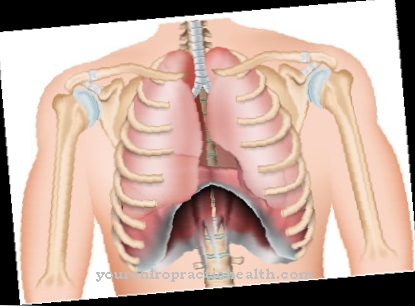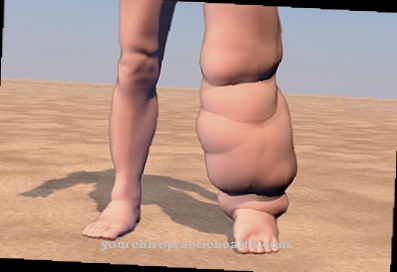Herpes simplex is an infectious disease caused by viruses. The disease is divided into 2 sub-forms. While type 1 (HSV-1) is predominantly located on the lip, type 2 (HSV-2) occurs primarily on the genitals. This disease is usually harmless, but can be dangerous in individual cases.
What is herpes simplex?

© Cherries - stock.adobe.com
The word "herpes" is derived from the ancient Greek language "herpein" (= "crawl"). This means the creeping spread of the individual skin lesions. "Simplex" means "the simple form". With this addition, the disease can be distinguished from herpes zoster, the causative agent of chickenpox and shingles.
In most cases, both types of herpes are skin diseases. Occasionally a generalized form can develop in immunocompromised people. This usually happens through herpes sepsis or inflammation of internal organs, such as on the retina (herpes simplex retinitis) of the eye or in the esophagus (herpes simplex esophagitis). About 90% of all adults are infected with HSV-1, while it is only 5% to 30% for HSV-2.
causes
In a person who has been infected with the herpes virus once in their life, the disease remains latent in the nerve nodes (ganglia) of the body.
The initial infection can be symptom-free. The virus is dormant in the body for life, which is known as a persistent infection. In fact, the disease is transmissible even in this condition. HSV-1, which mainly appears as lip vesicles, is passed on in childhood.
This happens either through direct contact with the mucous membrane (e.g. kissing) or as a droplet infection through the air (e.g. sneezing, breathing on). Infection with HSV-2 mainly occurs during sexual intercourse. The infection is therefore one of the sexually transmitted diseases.
Symptoms, ailments & signs
Herpes simplex typically manifests as itchy, burning blisters around the mouth, lips, face, and genitals. The vesicles are usually filled with water or pus and burst after a few days to weeks. A painful crust then forms on the affected area, which usually falls off after a few days.
As the disease progresses, it can spread to other parts of the body and affect, for example, the cheeks, eye area, nasal opening and earlobes. Occasionally there is also a feeling of illness. Those affected then feel tired and weak or have a slight fever. If it is genital herpes, pain and burning when urinating and an uncomfortable itch are added. Often times the lymph nodes are swollen.
If herpes simplex is not treated, the symptoms can increase in intensity and significantly affect the person's well-being. There is also an acute risk of infection. Two-thirds of people who carry the virus do not experience any symptoms.
The first signs that the disease is about to break out are painful areas around the corners of the mouth and nose as well as an acute feeling of illness that does not seem to have any underlying cause. If these symptoms are noticed, a doctor should be consulted.
Diagnosis & course
Symptoms only occur in 1% of cases with an initial HSV-1 infection. Typically, the first disease occurs in the form of oral rot (aphthous stomatitis). Aphthae and lesions on the oral mucosa are the result. It can also cause blisters on your lips. Mostly it is a collection and not a single lesion like a relapse.
An acute condition with a herpes infection is associated with a typical course. It begins with a feeling of tension and swelling in one part of the lips (in HSV-1). A visible swelling will be present in a few hours. After 1 to 2 days, the skin forms a series of small, fluid-filled vesicles. Over the course of another 3 to 5 days, the blisters become encrusted and dry up.
In the case of HSV-2, the initial infection is in most cases with severe symptoms. In principle, genital herpes infection is similar to an HSV-1 outbreak. Because of the sensitive region, HSV-2 is much more painful. With frequent relapses, the virus can, in the worst case, lead to years of suffering.
Herpes simplex can be diagnosed in a number of ways. A clinical diagnosis is usually sufficient. A laboratory blood test can determine whether antibodies to HSV-1 or HSV-2 are present. However, this method is of limited use.
Since the infection rate for cold sores is around 90%, the majority of people in the laboratory have positive values without any connection with the current symptoms. An expensive and very complex diagnostic technique is the PCR method (polymerase chain reaction), whereby the DNA of the virus can be detected directly if it is present.
Complications
Infection with the herpes simplex virus can cause serious complications. First of all, there is a risk that the infection will spread to areas of the skin that have already been damaged. Such a superinfection makes the healing process much more difficult and is associated with other general symptoms such as fever and fatigue.
In certain risk groups (newborns, people suffering from HIV, patients undergoing chemotherapy), herpes simplex can overload the immune system. This can lead to life-threatening complications such as pneumonia, herpes encephalititis or herpes inflammation of the brain. Occasionally, the eyes (herpes simplex retinitis) can also be affected, associated with impaired vision and scarring of the cornea.
In severe cases, infection can cause herpes sepsis. This leads to blood poisoning and a partial failure of the immune system, which is usually fatal. In rare cases, nerves are also involved, which in turn leads to nerve paralysis and functional disorders. Sometimes infection with the virus can also lead to herpes simplex meningoencephalitis.
This is an inflammation of the brain that is associated with flu-like symptoms and disorders of consciousness. If meningoencephalitis is left untreated, it can lead to a coma or even death.
When should you go to the doctor?
Herpes simplex is usually a harmless infection that usually does not require medical attention. Almost everyone carries the herpes virus. At times, however, it can become active, whereby the infection usually manifests itself through blisters on the lip. In rare cases there are other locations of the virus, special forms or generalized infections that require a medical examination.
The doctor should be consulted, among other things, if larger areas of skin are infected with herpes sores (eczema herpeticatum), if retinal inflammation occurs, in facial paralysis, in stomatitis aphthosa (rotten mouth) or esophagitis. Eczema herpeticatum is often associated with a severe feeling of illness and can even lead to herpes simplex encephalitis in immunocompromised people, which is often fatal.
Therefore, the doctor must be consulted immediately if psychotic symptoms such as behavior change, confusion or disorientation suddenly occur in addition to a high fever. The retinal inflammation caused by herpes viruses can lead to blindness without medical treatment.
Generalized herpes simplex should also be used as an opportunity to consult a doctor, as this can lead to disease progression similar to sepsis. If you get herpes infection during pregnancy, you must also consult a doctor because there is a high risk of the virus being transmitted to the unborn child.
To avoid infection, the child must be delivered by a caesarean section. Herpes infections in newborns also urgently require treatment because they can lead to serious complications, including herpes simplex encephalitis.
Doctors & therapists in your area
Treatment & Therapy
Herpes simplex is mainly treated with antivirals (drugs against viruses). Common preparations are acyclovir or penciclovir. In mild cases, a skin cream with the appropriate active ingredients is prescribed. In the case of serious illnesses or people with weakened immune systems, the medication can also be administered in tablet form or as an infusion. An alternative are herpes plasters, which use hydrocolloids to form a moist cushion around the blisters and thus prevent them from spreading.
The disease itself is incurable. Only the acute outbreak can be treated. The medication shortens and alleviates the course of the disease. The viruses in the nerve cells could not be destroyed by any therapy.
Research is currently focusing on helicase-primase inhibitors, which attach to the enzymes that the virus needs to duplicate. So far, the first successes have already been achieved in animal experiments. The effectiveness of certain home remedies such as toothpaste, zinc paste or tea tree oil has not been scientifically proven.
Outlook & forecast
The prognosis for herpes simplex is favorable. Normally, symptoms are relieved within a few days. The course of the disease can be positively influenced if the person concerned takes drug treatment as soon as the first symptoms start to appear. The application of ointments or special plasters curbs the herpes simplex. This prevents the virus from spreading and the damaged areas of skin also heal faster.
Without medical treatment, there will be delays in the course of the disease. The disease resolves itself after about seven to ten days. There is also the risk of the virus spreading. If cold sores burst, fluid will leak out and new sores will form.
Most patients still heal within a week. Using alternative healing methods can also help you recover from herpes simplex.
Using home remedies or suitable natural healing products can help relieve symptoms and improve healing.
Despite the good prognosis, most of those affected have a repeated outbreak of herpes simplex in the course of their lives. In children, the infection can spread to the entire body and also become life-threatening.
prevention
A relapse is often associated with an immunocompromised situation, such as a cold. To avoid reactivation of the viruses, a healthy diet rich in vitamins is important. In the event of an acute outbreak, skin contact with other people should be avoided. With HSV-2, no sexual intercourse should take place during a relapse.
Aftercare
Compared to the initial infection, a renewed infection with the Herpes Simplex disease is significantly weaker. This is because the body is already familiar with the virus and thus establishes effective defense mechanisms faster. It is not uncommon for those affected not to notice herpes simplex at all when it recurs. If symptoms persist, however, patients should definitely consult a doctor.
This makes a diagnosis based on external observation. The pathogen is rarely determined separately in the laboratory. The nature of the disease means that there is no scheduled follow-up examination. Herpes simplex either goes away on its own or is successfully combated with antiviral drugs. Special precautionary measures based on medical advice are not suitable to prevent the disease from recurring.
So far there is no effective vaccination. Patients are responsible for preventive measures. You should strengthen your immune system by eating a balanced diet, exercising regularly, and getting enough sleep. Persistent stress can also weaken the immune system. Contraception is recommended for contact with unfamiliar sexual partners. After the symptoms have subsided, it is possible to continue a normal life. Complications are not to be expected.
You can do that yourself
Herpes simplex is a viral disease that breaks out particularly in people with a weakened or unstable immune system. Affected people can therefore contribute a lot through their lifestyle to ensure that their organism is and remains strengthened.
For this he should eat as healthily as possible and drink enough fluids. A balanced diet rich in vitamins helps to avoid obesity and promotes your own health. Sufficient exercise, doing sports or, especially in the winter months, taking regular saunas also support the immune system and help to maintain one's own well-being.
People who are convinced that herpes simplex occurs due to psychological problems, stress or emotional burdens should independently create framework conditions in which these trigger factors are minimized as far as possible.
As soon as the first feeling of blistering caused by the herpes simplex, the person affected should take measures to alleviate the problem. The viruses often spread and multiply within a few hours without intervention. The symptoms can be alleviated and treated with medical preparations or various home remedies.
Avoid opening the cold sore. The fluid in the vesicles is contagious and can cause more vesicles to form in the surrounding areas. In order to avoid infection in principle, the exchange of saliva with infected people should be avoided.


.jpg)
.jpg)























